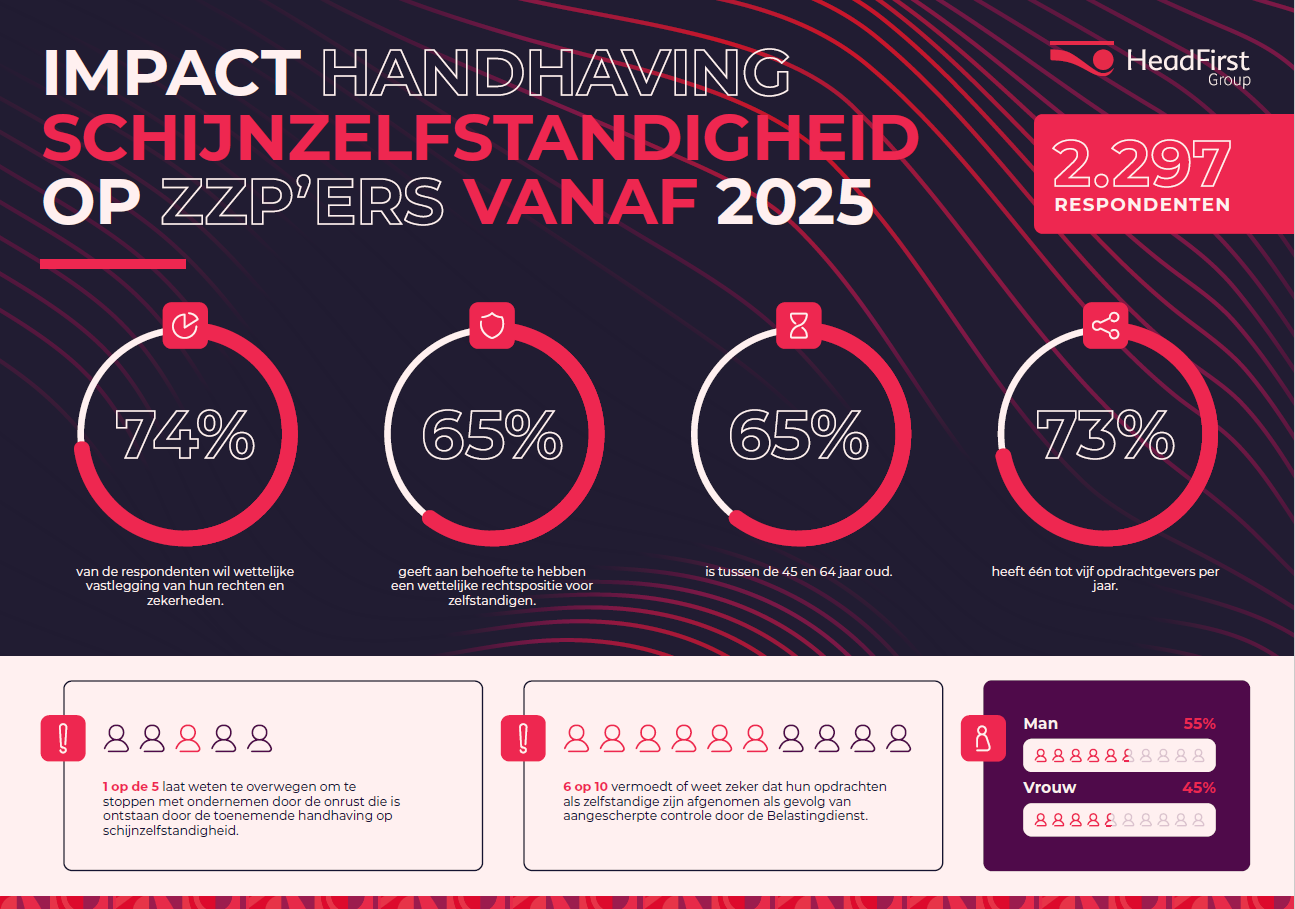Since the resumption of enforcement on false self-employment in early 2025, many self-employed people are experiencing the consequences in their work. For the first time in years, the number of self-employed is falling, by about 22,000 according to the Self-Employed Labor Survey (ZEA 2025, Central Bureau of Statistics). With that, an important issue is once again at the center of attention: how do we preserve space for self-employment while addressing false self-employment?
Together with research bureau Motivaction and various market parties, we examined the impact of enforcement. The results show that self-employed people have concerns, but above all indicate clearly what they need to continue working successfully: legal entrenchment, clear criteria and retention of autonomy. Key survey results:
- 60% of self-employed workers experience fewer assignments since stricter enforcement.
- 75% advocate for legal clarity and a firm legal framework.
- Only 8% switched to salaried employment: the vast majority deliberately choose self-employment.
These figures make it clear that self-employed people are not dropping out en masse, but rather are looking for security within their entrepreneurship.
Self-employed deliberately choose entrepreneurship
The survey of 2,300 self-employed people showed that nearly 20% are considering quitting, but the majority continue to consciously choose entrepreneurship. Alternatives such as salaried employment or secondment are not very popular: only 8% actually switched. Although 40% were offered an alternative contract, half of them have not yet made a choice. Where possible, self-employed people prefer to seek cooperation through a limited liability company or cooperative (27%).
At the same time, a quarter doubt their legal status and 60% experience fewer assignments since tighter controls, especially in the group with an hourly rate between €76 and €100 that balances between autonomy and the risk of re-qualification. Even in sectors with the greatest pressure - ICT, healthcare and hospitality - the appeal of entrepreneurship remains strong, which is crucial given the structural staff shortages in these industries.
Great need for legal entrenchment
What the self-employed need most of all is clear legal entrenchment. Three-quarters of respondents call for a legal framework that offers both autonomy and protection. We stress the importance of combating false self-employment, but without limiting the freedom and flexibility of hundreds of thousands of professionals. In a tight labor market, it is risky to push out the self-employed without a full-fledged alternative.
Maintaining freedom of choice is crucial
The discussion about false self-employment goes beyond laws and regulations. It touches on fundamental values of our labor market: freedom of choice, agility and the multicoloredness of workers.
We see it as the joint responsibility of politicians, policymakers and the market to balance these values. We call for:
- clear review criteria that provide legal certainty for both self-employed workers and clients;
- recognition of the diversity among self-employed people, because there is no one type of self-employed person;
- A sustainable legal framework that ensures independence, with proper protection.
Together toward a future-proof labor market
The self-employed are an essential part of a healthy and agile labor market. Their entrepreneurship deserves space, recognition and legal clarity. We remain committed to a labor market in which self-employment and employment can coexist, and in which professionals have the freedom to use their talent in their own way.
Request a free consultation

Questions about this? Please contact us.
Sem Overduin
Public Policy & Affairs Manager
Sem.Overduin@headfirst.nl
Oifik Youssefi
Public Affairs Officer
Oifik.Youssefi@headfirst.nl
Maaike van Driel
Head of Legal
Maaike.vanDriel@headfirst.group
Thomas ten Veldhuijs
Senior Legal Counsel
Thomas.tenVeldhuijs@headfirst.nl

